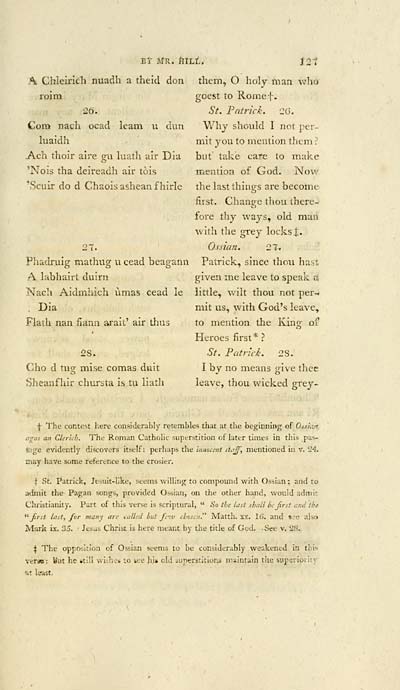Ossian Collection > Report of the Committee of the Highland Society of Scotland, appointed to inquire into the nature and authenticity of the poems of Ossian
(301)
Download files
Complete book:
Individual page:
Thumbnail gallery: Grid view | List view

BY MR. ftlLÌ.
A. Chleirich nuadh a theid don
roim
20.
Com nach ocad learn u dun
luaidh
Ach thoir aire gu luafh air Dia
1 Nois tha deireadh air tòis
'Scuir do d Chaois ashean f hirle
Ì2
Phadruig mathug u cead beagann
A labhairt duirn
Nach Aidmhich ùmas cead le
Dia
Flath nan fiann arait' air thus
2S.
Cho d tug mise comas duit
Sheanfhiir chursta is tu liath
them, O holy man who
goest to Romef.
St. Patrick. 20.
Why should I not per-
mit you to mention them ?
but take care to make
mention of God. Now
the last things are become
first. Change thou there-
fore thy ways, old man
with the grey locks X-
Ossian. 27«
Patrick, since thou hast
given me leave to speak tì.
little, wilt thou not per-,
mit us, with God's leave,
to mention the King of
Heroes first * ?
St. Patrick. 2S.
I by no means give thee
leave, thou wicked grey-
f The contest here considerably resembles that at the beginning of Oss'nuz
agus an Clench. The Roman Catholic superstition of later times in this pas-
sage evidently discovers itself: perhaps the innocent shrj', mentioned in v. 24.
may have some reference to the crosier.
f St. Patrick, Jesuit-like, seems willing to compound with Ossian; and to
admit the Pagan songs, provided Ossian, on the other hand, would admit
Christianity. Part of this verse is scriptural, " So the last shall be first
"first Inst, for many are called but fcio cLoslìi." Matth. XX. 16. and see also
Mark ix. 35. Jesus Christ is here meant by the title of God. See v. 28.
\ The opposition of Ossian seems to be considerably weakened in this
vera»: Wut he .till wishes \o see Jiik eld superstitions maintain the superiority
M least.
A. Chleirich nuadh a theid don
roim
20.
Com nach ocad learn u dun
luaidh
Ach thoir aire gu luafh air Dia
1 Nois tha deireadh air tòis
'Scuir do d Chaois ashean f hirle
Ì2
Phadruig mathug u cead beagann
A labhairt duirn
Nach Aidmhich ùmas cead le
Dia
Flath nan fiann arait' air thus
2S.
Cho d tug mise comas duit
Sheanfhiir chursta is tu liath
them, O holy man who
goest to Romef.
St. Patrick. 20.
Why should I not per-
mit you to mention them ?
but take care to make
mention of God. Now
the last things are become
first. Change thou there-
fore thy ways, old man
with the grey locks X-
Ossian. 27«
Patrick, since thou hast
given me leave to speak tì.
little, wilt thou not per-,
mit us, with God's leave,
to mention the King of
Heroes first * ?
St. Patrick. 2S.
I by no means give thee
leave, thou wicked grey-
f The contest here considerably resembles that at the beginning of Oss'nuz
agus an Clench. The Roman Catholic superstition of later times in this pas-
sage evidently discovers itself: perhaps the innocent shrj', mentioned in v. 24.
may have some reference to the crosier.
f St. Patrick, Jesuit-like, seems willing to compound with Ossian; and to
admit the Pagan songs, provided Ossian, on the other hand, would admit
Christianity. Part of this verse is scriptural, " So the last shall be first
"first Inst, for many are called but fcio cLoslìi." Matth. XX. 16. and see also
Mark ix. 35. Jesus Christ is here meant by the title of God. See v. 28.
\ The opposition of Ossian seems to be considerably weakened in this
vera»: Wut he .till wishes \o see Jiik eld superstitions maintain the superiority
M least.
Set display mode to: Large image | Transcription
Images and transcriptions on this page, including medium image downloads, may be used under the Creative Commons Attribution 4.0 International Licence unless otherwise stated. ![]()
| Permanent URL | https://digital.nls.uk/81752350 |
|---|
| Description | Selected books from the Ossian Collection of 327 volumes, originally assembled by J. Norman Methven of Perth. Different editions and translations of James MacPherson's epic poem 'Ossian', some with a map of the 'Kingdom of Connor'. Also secondary material relating to Ossianic poetry and the Ossian controversy. |
|---|
| Description | Selected items from five 'Special and Named Printed Collections'. Includes books in Gaelic and other Celtic languages, works about the Gaels, their languages, literature, culture and history. |
|---|

